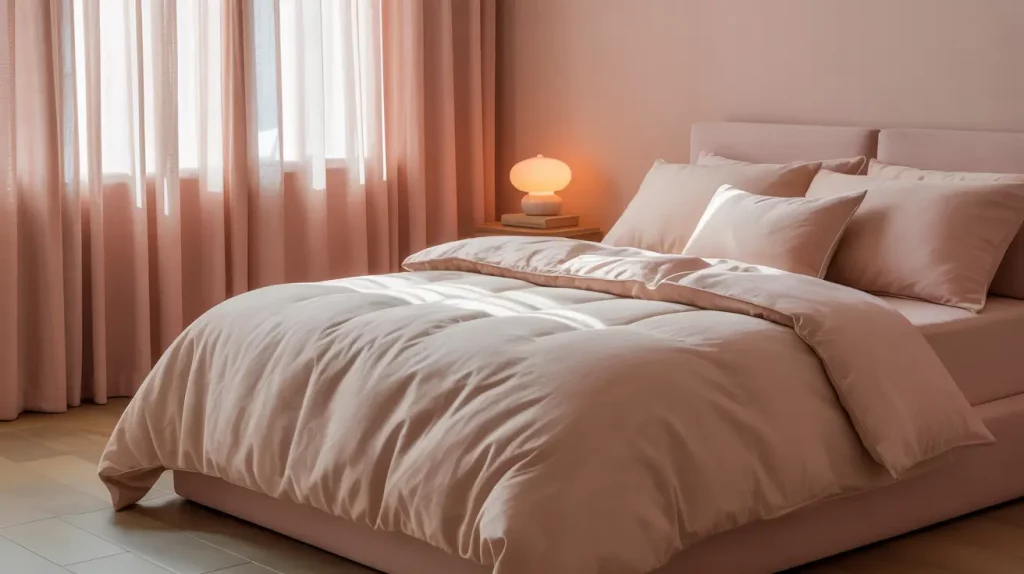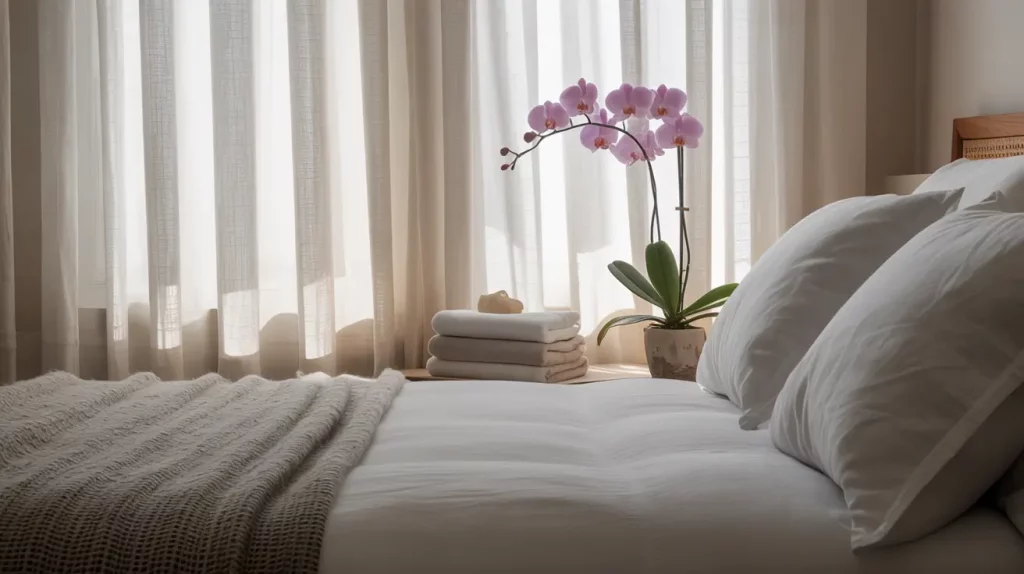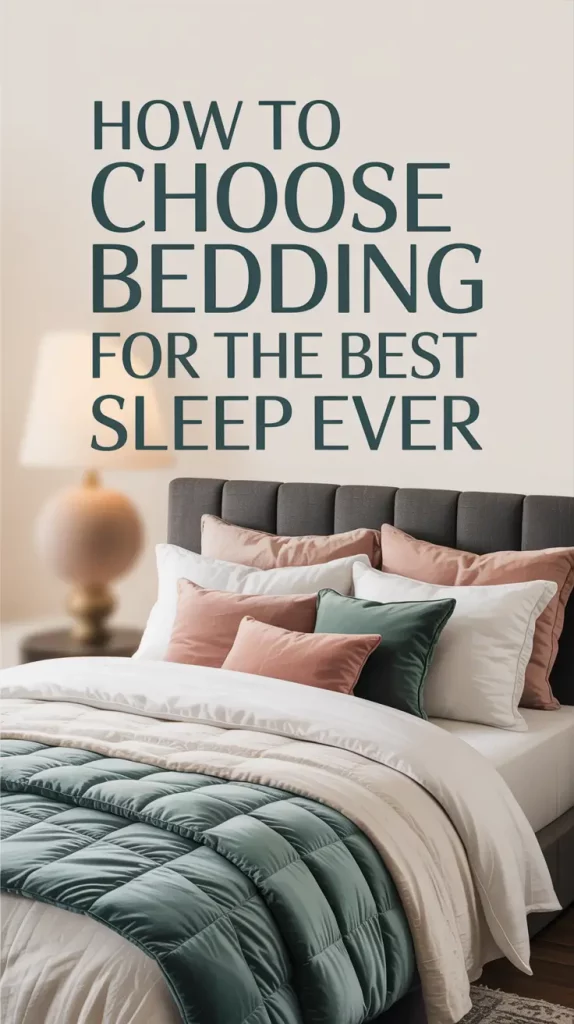How to Choose Bedding for the Best Sleep Ever in 2025

Have you ever woken up more tired than when you went to bed? I used to feel that way—waking up with swollen eyes and a stiff neck, wondering if I was sick. Spoiler: it wasn’t me. It was my bedding.
I used to believe that all sheets were similar, as long as they looked good. But the more I paid attention to how I felt each morning, the more I realized: what we sleep on directly affects how well we sleep. If you’re having trouble sleeping, your bedding could be the reason.
Let me walk you through what I learned (the hard way) and how you can choose the perfect bedding for the best sleep of your life. Not just cozy and cute—but actually restorative.
Why Bedding Affects Your Sleep More Than You Think
I didn’t realize this, but your sheets can affect how well you sleep. Before you buy a new mattress or gadgets, check your bedding. Seriously.
Microclimate and Temperature Control
The right sheets help you stay at a comfortable temperature all night. Even when the thermostat was the same, I would wake up sweaty in the summer and shivering in the winter. That’s when I learned about fabric breathability and moisture-wicking.
Cotton and bamboo help maintain a comfortable and steady sleep environment. They allow your skin to breathe and remove extra moisture, so you don’t get too hot or cold during the night.
Texture and Touch
Some bedding is soft when you first get it, but it can become scratchy after a few washes. I bought a set that was beautiful to look at but felt like sandpaper. Each night became a small annoyance and it definitely disturbed my sleep.
I understood: if I wouldn’t wear it as a T-shirt, I shouldn’t be sleeping in it.
Choosing the Right Material: It’s Not Just About Thread Count
It started with a sheet set I bought on sale—”high thread count” and all. However, they kept the heat in, became stiff and started to pill after only a few weeks. That’s when I realized that what you have is more important than how much you earn.
Here’s a breakdown I wish I had earlier:
| Material | Feel | Pros | Cons |
|---|---|---|---|
| Cotton | Soft, breathable | Natural, durable, widely available | May wrinkle, needs care |
| Bamboo | Silky, cool | Hypoallergenic, moisture-wicking | Pricier, delicate to wash |
| Linen | Textured, airy | Regulates temperature well | Coarse at first, expensive |
| Microfiber | Smooth, synthetic feel | Affordable, easy care | Less breathable, synthetic |
My Favorite: Bamboo
After trying almost everything, bamboo sheets changed the game. They were soft and smooth, just like satin, but still natural on the skin. No more waking up sticky in August.
If your skin is sensitive or the air is humid where you live, bamboo could be your best ally.
Size, Fit, and Density: Little Details That Matter
Here’s the part I didn’t expect: even the best material won’t help if your bedding doesn’t fit right. Have you ever had a corner of your fitted sheet come loose in the middle of the night? Been there.
3 Steps That Helped Me Choose the Right Sheets:
- Check thread density, not just count. Thread count (TC) around 300-500 is ideal for natural fibers. Anything more might just be marketing.
- Look for deep pockets. Especially if your mattress is over 12 inches. My first bamboo sheets were lovely—except they kept sliding off.
- Know your weave. Sateen feels silky and warm; percale is crisp and cool. I alternate depending on the season.
These little tweaks made a big difference. Suddenly, bedtime wasn’t a battle with corners and bunches.
Color, Mood, and Style: Yes, It Makes a Difference
It was a blush-pink set that I wasn’t sure I would like that started it all. But it made my bedroom feel like a peaceful place to be.
The colors in a room can affect our brain’s perception and our sleep.
What to Consider When Choosing Colors:
- Cool tones (blue, gray, sage) promote calm and sleepiness
- Neutrals (beige, white, ivory) feel fresh and clean
- Bold colors can energize—great for mornings, less so for winding down
- Patterns vs. solids: Small prints feel cozy, while solids give a spa-like feel
My Current Favorite:
A creamy rose-gray set with subtle stripes. It has a feminine touch but isn’t too much and looks lovely with soft lighting.
Caring for Bedding: The Invisible Step That Changes Everything
I would just wash everything on hot with a scented detergent and think that was enough. Until my sheets lost their softness fast.
How I Learned to Care (Without Complicating My Life):
- Wash on cold or warm, never hot
- Skip fabric softeners—they coat fibers and reduce breathability
- Use a mild, unscented detergent (great for sensitive skin too)
- Line-dry when possible to preserve the weave
Bonus tip? Ironing pillowcases makes your bed feel hotel-level indulgent. I don’t do it weekly, but for Sunday resets—yes.
Budget vs. Quality: Where to Save and Where to Splurge
This is where it all shifted for me. I thought quality bedding = $$$$. However, it’s smarter swaps that make a difference, not just having a big budget.
When to Invest:
- Your main sheet set (you’ll use it most)
- Natural fibers like bamboo or high-quality cotton
- Pillowcases if you have acne-prone or sensitive skin
Where You Can Save:
- Alternate sets for guests or laundry rotation
- Duvet covers over basic comforters
- Layering blankets and throws from budget-friendly stores
Don’t underestimate mixing and matching. My current setup? A premium bamboo pillowcase, mid-range cotton sheets and a simple jersey-knit throw. Total comfort without total spend.
Final Thoughts
I once believed that the key to good sleep was blackout curtains and herbal tea. But the real shift happened when I changed what was under me.
Your bedding is your body’s last touchpoint before sleep. When it supports, breathes, and comforts you—sleep transforms.
Have you ever thought about switching your sheets to notice any differences?
Pin this post if your next bedroom refresh is coming up!
What’s the one change you made to your bedding that made a big difference?








